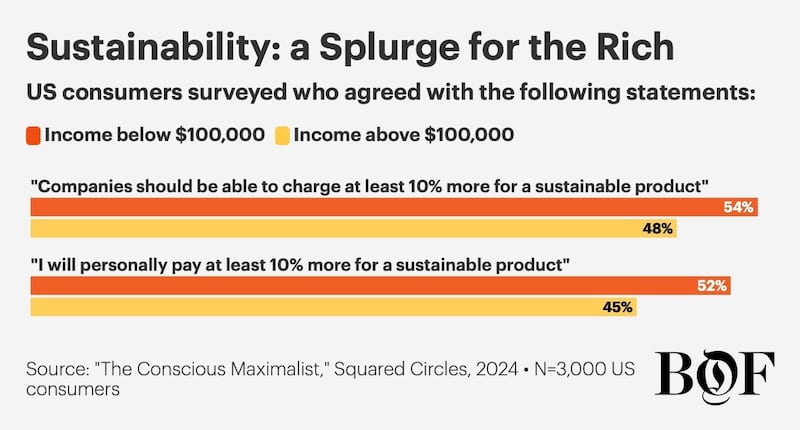
The Business of Fashion
Agenda-setting intelligence, analysis and advice for the global fashion community.

Agenda-setting intelligence, analysis and advice for the global fashion community.

Innovation to create sustainable beauty and fashion products and their packaging can be costly. But it’s not the wealthiest consumers that are the most interested in spending for eco-friendly practices, according to a new study by venture studio and brand incubator Squared Circles. The company has invested in brands like Nutrafol, which sold to Unilever, and $135-sweatshirt brand Pangaia.
The new research report, out on April 22, finds that over half of its 3,000 survey respondents are willing to make lifestyle changes to support sustainability. Sixty-four percent of those surveyed said they “recognise the need to compromise the way we live to ensure sustainability.” But that number drops when it comes to paying higher prices for sustainable products and practices, especially among consumers in a higher income bracket.

Among the surveyed group, 52 percent would be willing to pay 10 percent more for a sustainable product. But when taking out responses by anyone with a household income below at least $100,000, that percentage drops to less than half at 45 percent.
“The more wealthy this consumer is, the more they scrutinise, interestingly enough, how they spend their hard-earned money,” said Lukas Derksen, co-founder of Squared Circles.
ADVERTISEMENT
Gen X respondents were especially wary of sustainable products. Dividing its respondents into four psychographic groups, “Conscious Maximalists,” “Passive Activists,” “Checked Out” and “Modest Means,” the Gen X-dominant “Conscious Maximalist” segment was 27 percent more likely than average to strongly agree with the statement, “sustainable products don’t live up to the hype.”
However, the youngest segment of surveyed consumers was more willing to spend on sustainability than all age groups surveyed. Among the mainly 18-to-45-year-old “Passive Activists” profile, 76 percent believe that a company should be able to charge 10 percent more for a sustainable product, and 70 percent are willing to buy it. The rates for those making more and less than $100,000 were similar for this group, and 74 percent overall agreed that we must compromise our lifestyle for sustainability.
But one area of sustainability where most consumers said they are not willing to sacrifice is quality. Only 35 percent said they would be willing to buy a product with lower performance if it was more sustainable.
Learn more:
Don’t Believe What Consumers Say When It Comes to Sustainability
A growing body of consumer surveys suggests interest in sustainable consumption is reaching a tipping point. Those surveys are deeply flawed, writes Kenneth P. Pucker.
Editor’s note: An update on Apr. 22, 2024 changed “venture capital firm” to “venture studio.”

Liz Flora is a Beauty Correspondent at Business of Fashion. She is based in Los Angeles and covers beauty and wellness.
The fashion industry continues to advance voluntary and unlikely solutions to its plastic problem. Only higher prices will flip the script, writes Kenneth P. Pucker.
The outerwear company is set to start selling wetsuits made in part by harvesting materials from old ones.
Companies like Hermès, Kering and LVMH say they have spent millions to ensure they are sourcing crocodile and snakeskin leathers responsibly. But critics say incidents like the recent smuggling conviction of designer Nancy Gonzalez show loopholes persist despite tightening controls.
Europe’s Parliament has signed off rules that will make brands more accountable for what happens in their supply chains, ban products made with forced labour and set new environmental standards for the design and disposal of products.